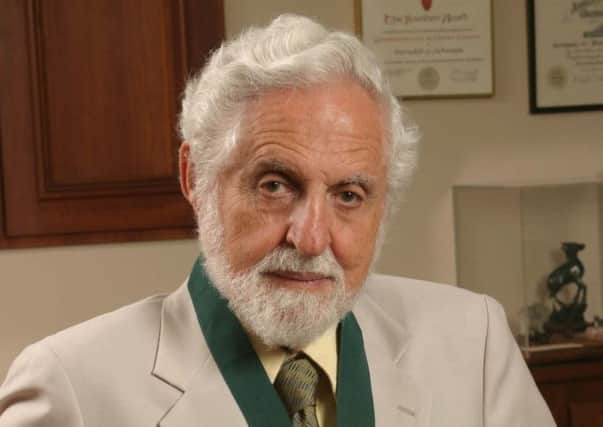Lori Anderson: Celebrate the birth of the Pill


The Catholic Church rarely gives us something to smile about but this week we had the esteemed archbishop, Giovanni Becciu, saying that “the Pope is truly sorry” for his indiscreet chastisement that Catholics had no need to breed “like rabbits”.
CONNECT WITH THE SCOTSMAN
• Subscribe to our daily newsletter (requires registration) and get the latest news, sport and business headlines delivered to your inbox every morning
Advertisement
Hide AdAdvertisement
Hide AdLast month the Holy Father had urged “responsible parenthood” and said that three children “was about right”. I couldn’t help but wonder what Dr Carl Djerassi would have made of the Pope’s apology but sadly the eminent chemist was by then already floating off to his eternal reward.
The death, at the age of 91, of the man described as “the Father of the Pill” deserved wider coverage and hundreds of millions of women should give thanks for the profound change and introduction of choice that would come into their lives as a result of an afternoon’s experiment in a small laboratory in Mexico City on 15 October 1951.
Chemists had known that high levels of oestrogen and progesterone would prevent ovulation in women but attempts to synthesise the hormones using animal or plant extracts had previously proved prohibitively expensive and also ineffective. As associate director of research for Syntex, Dr Djerassi was studying both cancer and menstrual disorders when he and a couple of student assistants successfully synthesised a progestin called norethindrone which would eventually become the key ingredient of the combined oral contraceptive pill or the Pill.
It would take another nine years before the first oral contraceptives, including one developed by Syntex, progressed through medical trials and on to the market but their arrival marked a profound change in the lives of women.
For the first time in the history of human sexual relations women could take control over their fertility. Instead of persuading or even pleading for their husbands or partners to use a condom, they could take charge and decide whether or not they wished to have a child.
For millennia, the act of sex was inextricably linked to procreation and for women, this had carried the extra risk to their life and health through the perpetual trauma of pregnancy and childbirth.
The Pill unshackled sex from procreation, triggering debates over promiscuity, morality and the wantonness of women in what remained a patriarchal society. The Pill also allowed couples to more effectively plan pregnancies and the size of their families.
In 1967, Time magazine put the Pill on its cover and soon after it was revealed that since the introduction of oral contraceptives there had been a sharp increase in college attendance and university graduation rates among women. Today around 100 million women worldwide, and a third of women aged 16-49 in the UK, are on some form of the Pill.
Advertisement
Hide AdAdvertisement
Hide AdDr Djerassi went on to write a book on the politics of contraception but one person would remain unconvinced to the societal benefit of his invention. When Pope Paul VI published Humanae Vitae in 1968 he ignored the advice of a committee of Catholic married couples who were in favour of permitting contraception and instead ruled against its adoption by the faithful. I like to think that the decision might have been different if Pope Francis had the casting vote.
The scientific breakthrough in Mexico City would make Dr Djerassi a wealthy man but his intellectual curiosity was unwavering and he would go on to author what he described as “science in fiction” novels, 1,200 scientific papers as well as inventing pyribenzamine, the world’s first commercial antihistamine. Yet it was his service to womankind for which he will largely be remembered and for which he was surprisingly humble. As he said in an interview: “Yes, I am proud to be called the father of the Pill. But identifying scientists is really only a surrogate for identifying the inventions or discoveries. Maybe it is true that Shakespeare’s plays would never have been written if it wasn’t for Shakespeare. But I’m certain that if we didn’t do our work, then someone else would have come along shortly afterwards and done it.”
Shakespeare may have coined the term in English “the beast with two backs” but for hundreds of millions of couples, Dr Djerassi helped make it safer and more fun.
SCOTSMAN TABLET AND IPHONE APPS